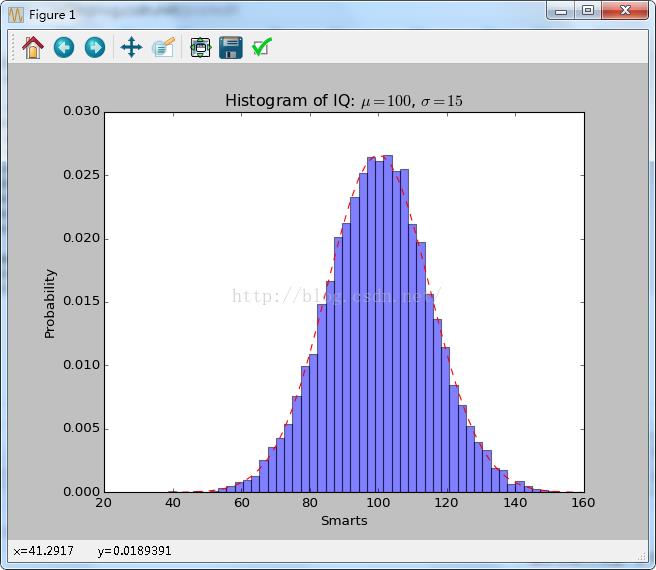hist
Posted 易然~
tags:
篇首语:本文由小常识网(cha138.com)小编为大家整理,主要介绍了hist相关的知识,希望对你有一定的参考价值。
转载:python中plt.hist参数详解
data3[name].hist(bins=50,alpha=0.5,color=\'b\')
plt.title(name)
plt.show()
normed=True画频率直方图
matplotlib.pyplot.hist(
x, bins=10, range=None, normed=False,
weights=None, cumulative=False, bottom=None,
histtype=u\'bar\', align=u\'mid\', orientation=u\'vertical\',
rwidth=None, log=False, color=None, label=None, stacked=False,
hold=None, **kwargs)
x : (n,) array or sequence of (n,) arrays
这个参数是指定每个bin(箱子)分布的数据,对应x轴
bins : integer or array_like, optional
这个参数指定bin(箱子)的个数,也就是总共有几条条状图
normed : boolean, optional
If True, the first element of the return tuple will be the counts normalized to form a probability density, i.e.,n/(len(x)`dbin)
这个参数指定密度,也就是每个条状图的占比例比,默认为1
color : color or array_like of colors or None, optional
这个指定条状图的颜色
我们绘制一个10000个数据的分布条状图,共50份,以统计10000分的分布情况
"""
Demo of the histogram (hist) function with a few features.
In addition to the basic histogram, this demo shows a few optional features:
* Setting the number of data bins
* The ``normed`` flag, which normalizes bin heights so that the integral of
the histogram is 1. The resulting histogram is a probability density.
* Setting the face color of the bars
* Setting the opacity (alpha value).
"""
import numpy as np
import matplotlib.mlab as mlab
import matplotlib.pyplot as plt
# example data
mu = 100 # mean of distribution
sigma = 15 # standard deviation of distribution
x = mu + sigma * np.random.randn(10000)
num_bins = 50
# the histogram of the data
n, bins, patches = plt.hist(x, num_bins, normed=1, facecolor=\'blue\', alpha=0.5)
# add a \'best fit\' line
y = mlab.normpdf(bins, mu, sigma)
plt.plot(bins, y, \'r--\')
plt.xlabel(\'Smarts\')
plt.ylabel(\'Probability\')
plt.title(r\'Histogram of IQ: $\\mu=100$, $\\sigma=15$\')
# Tweak spacing to prevent clipping of ylabel
plt.subplots_adjust(left=0.15)
plt.show()

以上是关于hist的主要内容,如果未能解决你的问题,请参考以下文章
